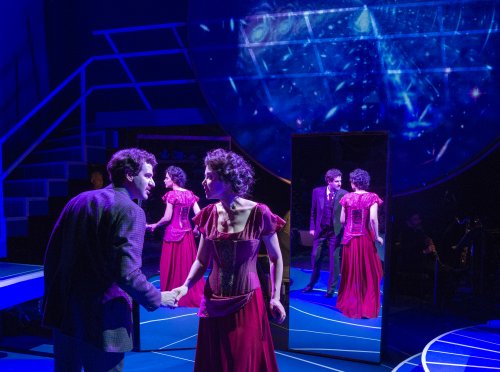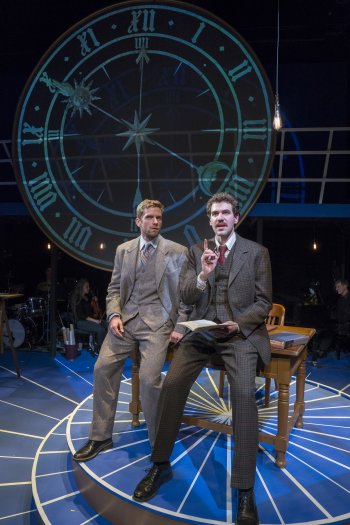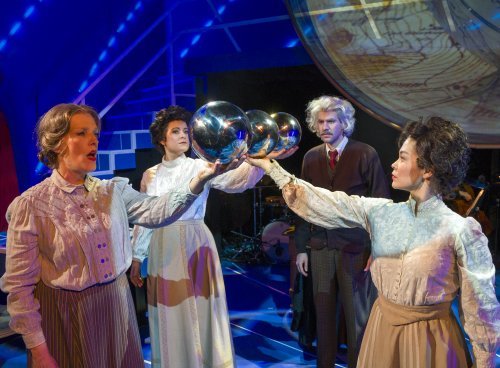Einstein’s Dreams
Based on the Alan Lightman novel, a charming musical dramatizing how the famed physicist came up with the theory of relativity with the help of a beautiful muse.

Zal Owen and Alexandra Silber in a scene from the new musical “Einstein’s Dreams” at 59E59 Theaters (Photo credit: Richard Termine)
[avatar user=”Victor Gluck” size=”96″ align=”left”] Victor Gluck, Editor-in-Chief[/avatar]
Alan Lightman’s 1992 internationally best-selling novel Einstein’s Dreams would seem like an unlikely choice for stage adaptation as the original book is made up of 30 variations on theories of time but includes no plot. However, as adapted by Joanne Sydney Lessner (book and lyrics) and Joshua Rosenblum (music and lyrics) it is a charming period musical that makes Einstein’s theories of time (at least the ten dramatized) quite accessible to audiences not made up of physicists. Its lovely score and excellent production directed by Prospect Theater Company’s Cara Reichel led by Zal Owen and Alexandra Silber are both entertaining and mind-expanding. Its deficiencies are ones that were also true of the novel.
We meet the 26-year-old physicist Albert Einstein, an assistant examiner in the patent office in Berne, Switzerland, in 1905. He is bored with his job, out of love with his wife Mileva, and despises his boss, the officious Paul Klausen. The only saving grace is that his friend the physicist Michele Besso also works in the same office and often saves him from being caught sleeping by their boss. Einstein has even taken to staying in the office overnight as he can’t work at home with his baby crying. Einstein’s mind is currently occupied by attempting to resolve the link between electric and magnetic forces, the stumbling block in physics at that time, and he is fully enjoying his dreams. Knocking off his office work in record time allows Einstein time to dream about his evolving theory.
In his dreams, Einstein meets Josette, a mysterious and beautiful woman with whom he falls in love and who leads him on a journey through theories of time, one in each dream. While the novel dealt with 30 dreams, the musical has reduced it to a less unwieldy ten. Josette takes Einstein to alternate worlds where time is finite, time works on three planes simultaneously, time is infinite, time standing still, etc. In each case, the people in Einstein’s life (his colleagues in the office, his friends and family) appear as characters in these dreams although he does not recognize them. He is warned that “Everyone in the future will know who you are, but almost nobody will understand your ideas,” a fate which upsets him greatly. He reaches the end of his investigations into time with Josette but at a price, deciding to return to Mileva whom he loved once.

Brennan Caldwell and Zal Owen in a scene from the new musical “Einstein’s Dreams” at 59E59 Theaters (Photo credit: Richard Termine)
One of the problems with the original material which has crept into the musical adaptation is that we learn almost nothing about the characters including the young Einstein other than that his wife was the only woman in his college program and that he is unsuited to working in the patent office. (He does, however, enjoy correcting the drawings and proposals submitted to him in order to make them work.) As a result, the characters seem thinly drawn and it is difficult to identify with any one of them. Einstein completes his theory of relativity by the end of the show but we are never given a summary or an explanation of how his time travels have helped.
Under Reichel’s assured direction, the show is helped immeasurably by the fine cast and the engaging and pleasing score which includes lovely ballads and witty patter songs with lyrics by both Lessner and Rosenblum. The most memorable are Besso and Einstein’s clever “Love Is Not A Science,” Einstein’s syncopated “The Relativity Rag,” Klausen and Besso’s poignant, “I Never Told Him I Loved Him,” and the heart-breaking, “I Will Never Let You Go,” sung by a mother to a daughter. Einstein and Josette have a series of lovely duets (“Are Your There?,” “I Want to Love You,” “It’s Always the First Time for Love,” and “Einstein’s Dreams”) made ever more impressive by Alexandra Silber’s lush soprano. As played by a six piece band made up of piano, percussion, violin, woodwinds, cello and bass, Rosenblum’s music has a beautiful chamber sound, so unlike many modern musicals with their raucous orchestrations and sound designs.
As Einstein, Owen is a sympathetic yet rather bland hero, but this is as much a fault of the writing as the acting. However, Silber makes up for this with a ravishing portrait of the fictional Josette, a woman of the world who understands everything that Einstein does not. Brennan Caldwell as Besso is the genially mocking, loyal friend to Einstein, making more of his character than is given. Michael McCoy remains a figure of fun as the pompous name-dropping Klausen. As the long-time secretary Hilda, Stacia Fernandez is nicely stuffy, while she is more bending as various townspeople in Einstein’s dreams. Tess Primack is charming as the wry typist Marta, while Lisa Helmi Johanson is perceptive as Besso’s loving wife. Vishal Vaidya as the new patent clerk Johannes is modest and retiring.

Stacia Fernandez, Tess Primack, Zal Owen and Lisa Helmi Johanson in a scene from the new musical “Einstein’s Dreams” at 59E59 Theaters (Photo credit: Richard Termine)
Faithful to the original material while at the same time expanding on it with songs and a plot, the musical of Einstein’s Dreams is a visual and aural treat. The blue and white unit set by Isabel Mengyuan Le (an office on the lower level which suggests a time piece or some sort of a map of the universe and a giant clock on a balcony) allows for swift transitions throughout the show. The terrific video design by David Bengali that is projected on the oversized clock creates different representations of time for each of the dream sequences. Herrick Goldman’s lighting design bathes the stage in various colors creating many moods.
Sidney Shannon’s graceful period costumes for what we now call the Edwardian Age is best in its elegant red dresses for Josette. The sound design by Kevin Heard is crystal clear, almost a novelty for musicals today. While there is not much dancing, assistant director Dax Valdes is responsible for the fluid movement for both the office scenes and the dream locales. Einstein’s Dreams is an unusual musical which will linger in the memory like a piece of music heard in the distance or a faint perfume, while not answering all your questions about the early life of the famed physicist. It may even send you to search out a more complete biography.
Einstein’s Dreams (through December 14, 2019)
Prospect Theater Company
Theater A, 59E59 Theaters, 59 East 59th Street, in Manhattan
For tickets, call 646-982-7999 or visit http://www.59e59.org
Running time: 100 minutes without an intermission






Leave a comment